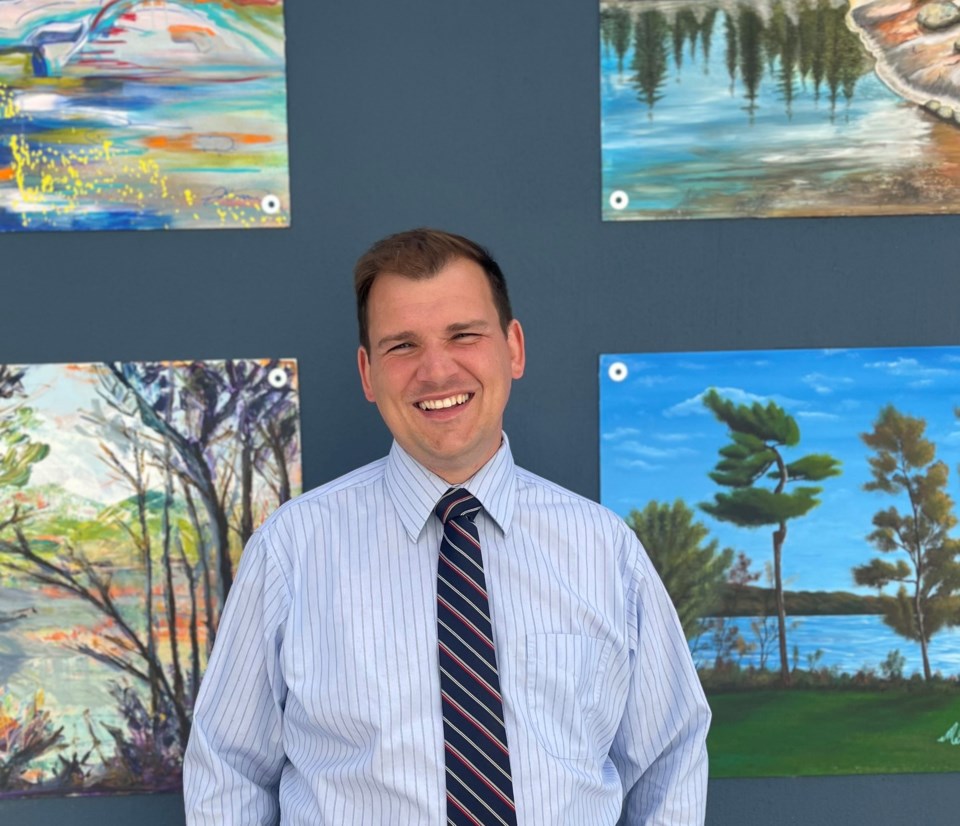Editor's note: MidlandToday has asked council candidates in Midland, Penetanguishene and Tiny Township to provide a synopsis of why they are running for public office. Municipal elections take place Oct. 24.
The following response is from Jonathan Main, who is running for mayor in Midland. For more election coverage, visit our 2022 municipal election page by clicking here, where you can find candidate profiles and other election news.
What is your name, what will be your age on election day, and who are your key immediate family members you rely on for support?
Jonathan Main, 38. I grew up in Midland, and my wife is from Penetanguishene so we’re fortunate to raise our two children with lots of support from their grandparents, aunts, uncles and our immediate family who live nearby.
In 10 words or less, why is your municipality the best in the province?
Amazing people, clean water, beautiful nature, small-town charm, butter tarts.
What prompted you to run as a municipal leader?
Having sat at the council table for every major decision in this town for the past eight years, I want to offer my continuous dedication, energy and enthusiasm to Midland. Midland faces complex issues and requires a multidisciplinary approach to finding solutions. The Town of Midland provides quality services, and mayor and council provide key guidance on critical issues.
Midland Bay Landing is mired in controversy, involving contaminated land, residents wanting to protect parkland, developer visions for the future, and the municipality’s choice for that developer. What is your stance on Midland Bay Landing?
I have supported the concept of the masterplan, which is to redevelop the area into a mixed-used livable community with significant focus on public realm, park and public access to the waterfront. Midland has the opportunity to remediate this industrial brownfield through sustainable development. I continue to advocate for the adoption of green tech, green buildings and/or roofs, and significant attention to adding as much biomass and green space into the development as possible. Selecting a private-sector partner would allow us to advance the project and move towards public consultation for urban design, landscaping and public-realm features.
You will be asked to join committees and other municipal representations. Which are you eager to become involved in?
I am greatly looking forward to serving on County Council, which provides such valuable services like transit and transportation, housing, waste management, and emergency management. Midland has success with our subcommittees and our partnership organizations like the Severn Sound Environmental Association (SSEA), Cultural Alliance and The Economic Development Corp (EDCNS).
Voter apathy is always a concern, ranging between 25.7% to 42% of cast ballots across North Simcoe in the last municipal election. Knowing you could be elected without even half of possible voters turning out, what will you do to combat voter apathy so your municipality is best represented?
Community engagement, specifically senior and youth engagement, is important to increase voter turnout. Increasing the opportunity for feedback like participatory budgeting would help with engagement and understanding the direct role Midland plays in delivering key services. A diverse list of candidates for council helps address a lack of representation. I’m also trying to visit every house in the community personally to encourage people to vote.
There are many prominent concerns ongoing in the region, from affordable housing to the opioid epidemic to short-term rentals as well as others. What is one concern that you think the majority of residents are not aware of?
Everyone is well aware of the housing crisis, and the lack of rental and affordable housing. There is not a strong understanding of how much poverty and socio-economic issues Midland residents are facing. Midland needs to focus on poverty reduction and develop policies around inclusion and income-inequality to create a just and prosperous community. Community-wide living wage adoption would help alleviate poverty locally.
The province is planning for a population of 555,000 and 198,000 jobs by 2051. If now is the time to prepare for that influx, what will you proactively do as your part in the process?
Midland is positioned well to grow with a newly adopted Official Plan, and next term we will work on updating our Zoning Bylaw. Midland has tremendous potential for infill and intensification in our urban core with a balanced approach to greenfield developments. Midland’s high livability allows for remote work possibility, and helps with the success of our advanced tech manufacturers.
Recidivism isn’t just on the police and courts. As a municipal leader and crafter of bylaws, what initiatives will you undertake to address crime in your care?
The Canadian justice system is one of the best in the world. We believe in rehabilitation, and yet a majority of offenders get in trouble only once. I would advocate for increased access to mental health and addiction counselling, access to education and affordable, supportive and transitional housing. Housing First is one model being considered to address homelessness, with additional support services increasing the success of the program.
Infrastructure projects require taxpayer dollars. What infrastructure project does the municipality desperately need, and does it justify a tax increase from the ratepayers to have it done as soon as possible?
Midland has a robust 10-year capital plan that includes road works, water and waste-water upgrades and replacements. Midland continues to access federal and provincial infrastructure grants, and we manage our infrastructure debt capacity carefully. Midland does need specific investment into public realm and parks, walkability and cycling infrastructure to increase age-friendliness.
Times change. What is the most aged or obsolete bylaw in your municipality’s code?
Midland’s current zoning bylaw requires updating. This is a critical policy that affects housing.
Once you complete your four-year term, what is the legacy you want residents to best remember for your time in office?
I advocated for the needs of Midland, was an ambassador on the provincial stage, was a collaborator, and fun and full of energy, just like the town itself. Midland thrived in a period of recovery and adaptation.



